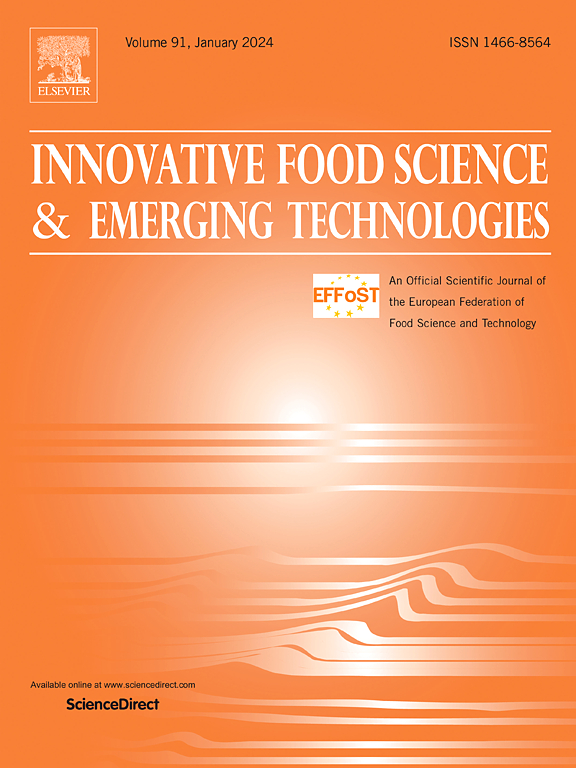用自供电触觉传感器对番茄果实成熟度进行非侵入性评价的反向称重
IF 6.8
1区 农林科学
Q1 FOOD SCIENCE & TECHNOLOGY
Innovative Food Science & Emerging Technologies
Pub Date : 2025-08-29
DOI:10.1016/j.ifset.2025.104209
引用次数: 0
摘要
考虑到番茄果实的巨大产量,对其成熟度进行无创评价可以显著改善其生产、销售和营养状况。本文采用两种类型的聚乙烯醇(PVA)/钛酸钡纳米颗粒(BTO)和PVA/HOCH2(CF2)3CH2OH(2,2,3,3,4,4-六氟戊烷-1,5-二醇(HFPD)压电水凝胶(PEHs)制备自供电触觉传感器,开发了一种反向称重策略,用于定量和无创地评估其在不同阶段的成熟度。根据PEHs的物理特性和单个PEHs触须在1 N的静压下产生的压电响应进行优化,采用3个1 N的静压PEHs触须评价番茄果实的成熟度,以避免可能造成的损伤。实验结果表明,随着番茄果实存放时间的增加,PEHs的压电响应逐渐降低,表明自供电触觉传感器具有分化成熟阶段的能力。此外,传感器的压电信号与番茄果实不同成熟阶段的内部pH值和灰度值具有相关性。在番茄果实由未成熟过渡到成熟的过程中,内部pH值和灰度值随着压电信号的减小而增大。这种策略可以潜在地扩展到机器人手的构建,用于非侵入性和定量评估水果的成熟度。本研究提出了基于PEHs的自供电触觉传感器在精准农业中的潜在应用前景。本文章由计算机程序翻译,如有差异,请以英文原文为准。
Reversed weighing for non-invasive evaluation of ripeness of tomato fruits with self-powered tactile sensors
Non-invasive evaluation of the ripeness of tomato fruits could significantly improve their production, marketing and nutrition considering their huge yields. Herein a strategy of reversed weighing was developed for quantitative and non-invasive assessment of their ripeness at different stages using self-powered tactile sensors prepared with two types of (polyvinyl alcohol (PVA)/barium titanate nanoparticles (BTO) and PVA/HOCH2(CF2)3CH2OH (2,2,3,3,4,4-hexafluoropentane-1,5-diol (HFPD) piezoelectric hydrogels (PEHs). PEHs were optimized based on their physical characteristics and piezoelectric responses generated from single PEHs tentacle under a static pressure of 1 N. Three PEHs tentacles with a static pressure of 1 N were applied for evaluation of tomato fruits ripeness to avoid any possible damages. Experimental results demonstrated that piezoelectric responses of PEHs gradually decreased with the increased storage days of tomato fruits, suggesting the capability of the self-powered tactile sensors for differentiation of the ripening stages. Furthermore, the piezoelectric signals of the sensors were correlated with the inside pH values and the gray values of tomato fruits at different ripening stages. The inside pH values and the gray values increased with the decreased of the piezoelectric signals when the tomato fruits transferred from immature to mature. This strategy could be potentially extended for construction of robotic hands for non-invasive and quantitative evaluation of the ripeness of fruits. This study suggested the potential applications of PEHs based self-powered tactile sensors for agricultural intelligence in precision agriculture.
求助全文
通过发布文献求助,成功后即可免费获取论文全文。
去求助
来源期刊
CiteScore
12.00
自引率
6.10%
发文量
259
审稿时长
25 days
期刊介绍:
Innovative Food Science and Emerging Technologies (IFSET) aims to provide the highest quality original contributions and few, mainly upon invitation, reviews on and highly innovative developments in food science and emerging food process technologies. The significance of the results either for the science community or for industrial R&D groups must be specified. Papers submitted must be of highest scientific quality and only those advancing current scientific knowledge and understanding or with technical relevance will be considered.

 求助内容:
求助内容: 应助结果提醒方式:
应助结果提醒方式:


